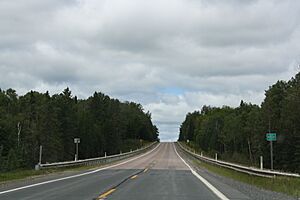Baraga County, Michigan facts for kids
Quick facts for kids
Baraga County
|
|||
|---|---|---|---|
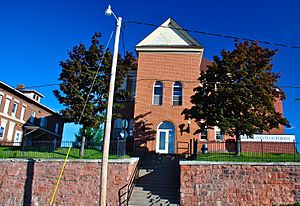
Baraga County Courthouse and Annex (July 2014)
|
|||
|
|||
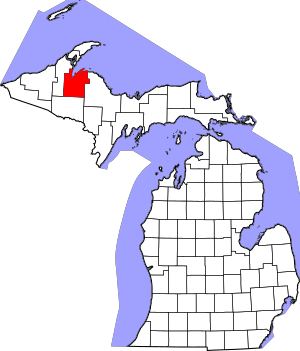
Location within the U.S. state of Michigan
|
|||
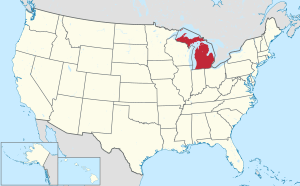 Michigan's location within the U.S. |
|||
| Country | |||
| State | |||
| Founded | February 19, 1875 | ||
| Named for | Frederic Baraga | ||
| Seat | L'Anse | ||
| Largest village | Baraga | ||
| Area | |||
| • Total | 1,069 sq mi (2,770 km2) | ||
| • Land | 898 sq mi (2,330 km2) | ||
| • Water | 171 sq mi (440 km2) 16%% | ||
| Population
(2020)
|
|||
| • Total | 8,158 | ||
| • Density | 9.9/sq mi (3.8/km2) | ||
| Time zone | UTC−5 (Eastern) | ||
| • Summer (DST) | UTC−4 (EDT) | ||
| Congressional district | 1st | ||
Baraga County (/ˈbɛərəɡə/ BAIR-ə-gə) is a county in the Upper Peninsula in the U.S. state of Michigan. As of the 2020 census, the population was 8,158, making it Michigan's fifth-least populous county. The county seat is L'Anse. The county is named after Bishop Frederic Baraga, a Catholic missionary who ministered to the Ojibwa Indians in the Michigan Territory.
The L'Anse Indian Reservation of the Ojibwa is within Baraga County.
Contents
Geography
According to the U.S. Census Bureau, the county has a total area of 1,069 square miles (2,770 km2), of which 898 square miles (2,330 km2) is land and 171 square miles (440 km2) (16%) is water.
The county is located in the state's Upper Peninsula on the shore of Lake Superior, at the southeast base of the Keweenaw Peninsula. The villages of Baraga and L'Anse are located at the base of Lake Superior's Keweenaw Bay. Point Abbaye projects north into the lake, enclosing Huron Bay. The eastern two-thirds of the county includes much of the Huron Mountains, including Mount Arvon—the highest natural point in Michigan at 1,979 feet (603 m).
Major highways
 US 41: runs north–south through the upper central part of county. The highway enters at the northeast corner of the county on the west shore of Keweenaw Bay and runs south along the shoreline to Baraga and L'Anse, then turns inland (south) past Alberta, then east through Nestoria and Three Lakes. It exits into Marquette County at Imperial Heights.
US 41: runs north–south through the upper central part of county. The highway enters at the northeast corner of the county on the west shore of Keweenaw Bay and runs south along the shoreline to Baraga and L'Anse, then turns inland (south) past Alberta, then east through Nestoria and Three Lakes. It exits into Marquette County at Imperial Heights. US 141: runs south from its intersection with US-41 south of Alberta into Iron County.
US 141: runs south from its intersection with US-41 south of Alberta into Iron County. M-28: enters the west side of the county then runs east and east-northeast to the intersection with US-141 at Covington.
M-28: enters the west side of the county then runs east and east-northeast to the intersection with US-141 at Covington. M-38: runs east–west through the northwest corner of county. It enters from Alston in Houghton County, then runs east to intersection with US-41 at Baraga.
M-38: runs east–west through the northwest corner of county. It enters from Alston in Houghton County, then runs east to intersection with US-41 at Baraga.
Adjacent counties
- Marquette County (east)
- Iron County (south)
- Houghton County (west)
National protected areas
- Keweenaw National Historical Park (part)
- Ottawa National Forest (part)
Communities
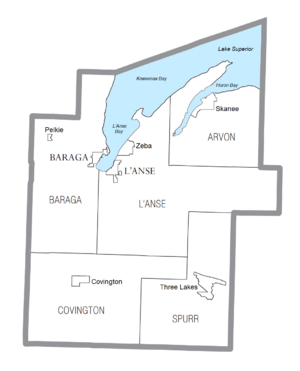
Villages
Civil townships
Census-designated places
Other unincorporated communities
Indian reservations
- The L'Anse Indian Reservation occupies two sections of Baraga County within portions of Baraga, L'Anse, and Arvon townships. The reservation also has very small portion in Chocolay Charter Township in neighboring Marquette County to the east.
Demographics
| Historical population | |||
|---|---|---|---|
| Census | Pop. | %± | |
| 1880 | 1,804 | — | |
| 1890 | 3,036 | 68.3% | |
| 1900 | 4,320 | 42.3% | |
| 1910 | 6,127 | 41.8% | |
| 1920 | 7,662 | 25.1% | |
| 1930 | 9,168 | 19.7% | |
| 1940 | 9,356 | 2.1% | |
| 1950 | 8,037 | −14.1% | |
| 1960 | 7,151 | −11.0% | |
| 1970 | 7,789 | 8.9% | |
| 1980 | 8,484 | 8.9% | |
| 1990 | 7,954 | −6.2% | |
| 2000 | 8,746 | 10.0% | |
| 2010 | 8,860 | 1.3% | |
| 2020 | 8,158 | −7.9% | |
| 2023 (est.) | 8,310 | −6.2% | |
| US Decennial Census 1790–1960 1900–1990 1990–2000 2010–2018 |
|||
The 2010 United States census indicated Baraga County had a population of 8,860. This was an increase of 114 people from 2000. In 2010 there were 3,444 households and 2,209 families in the county. The population density was 10 people per square mile (3.9 people/km2). There were 5,270 housing units at an average density of 6 per square mile (2.3/km2). Among the county, 75.0% of the population was White, 13.1% Native American, 7.2% Black or African American, 0.1% Asian, 0.2% of some other race and 4.4% of two or more races; 1.0% were Hispanic or Latino (of any race). Additionally, 22.5% were of Finnish, 9.1% German, 8.8% French, French Canadian or Cajun, 5.6% English and 5.5% Irish ancestry. By the 2020 census, its population was 8,158.
In 2010, there were 3,444 households, out of which 25.2% had children under the age of 18 living with them, 47.4% were married couples living together, 10.9% had a female householder with no husband present, and 35.9% were non-families. Of all households, 31.6% were made up of individuals, and 13% had someone living alone who was 65 years of age or older. The average household size was 2.28 and the average family size was 2.82. The age distribution of the county population was the following: 20.2% were under the age of 18, 7% from 18 to 24, 25.7% from 25 to 44, 29.7% from 45 to 64, and 17.2% who were 65 years of age or older. The median age was 42.9 years; 54.9% of the population was male, 45.1% was female.
As of 2010, the median income for a household in the county was $40,115, and the median income for a family was $50,996. The per capita income for the county was $19,076. About 9.5% of families and 13% of the population were below the poverty line, including 19.2% of those under age 18 and 6.7% of those age 65 or over. By the 2021 census estimates, its median household income was $45,792.
See also
 In Spanish: Condado de Baraga para niños
In Spanish: Condado de Baraga para niños




